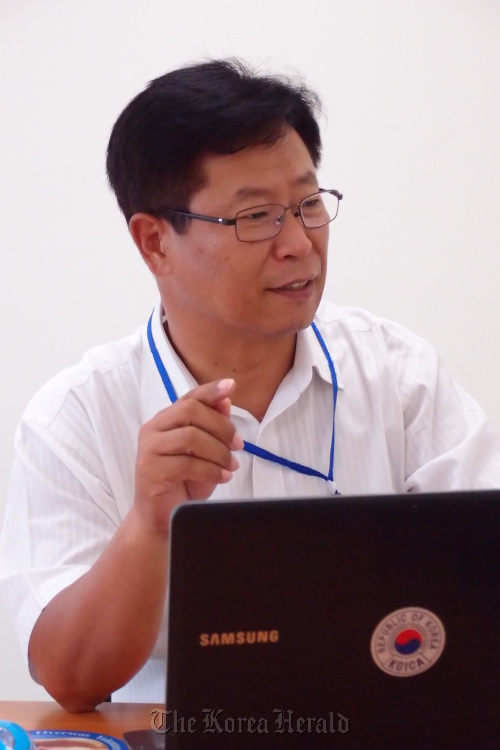VIENTIANE ― As a recently wealthy member of the international community, Korea is obliged to increase its aid for developing countries and its best option is sharing the lessons learned from its growth, which other nations can follow, said the head of the Laos branch of Korea’s aid agency.
“Developing countries face various obstacles when trying to stand on their own feet,” Kwon Young-eui, chief of the Korea International Cooperation Agency office in Vientiane, told The Korea Herald.
“Korea may be the best example for Laos, as it has the unique experience of overcoming its past poverty,” Kwon said.
The ultimate goal of the KOICA is to back their development and promote their economic and social independence.
He said the agency is currently focusing on health, education and agriculture.
One of its most successful projects is the construction of a children’s hospital. The agency also assisted in the education of the medical staff and the operational management.
The 70-room hospital is currently preparing to set up regional branches next year, Kwon explained.
“Some of the top characteristics of the KOICA are its efficient communication and swift work process, especially compared with other aid organizations,” the director said.
KOICA has proceeded unusually fast, completing about half of the project within a year, according to him.
Another merit of the aid organization is that it encourages recipient countries to make their own decisions based on their unique demands.
“The world’s most advanced countries have been assisting poor neighbors over the past decades but many of their projects ended fruitlessly,” the aid leader said.
 |
Kwon Young-eui, chief of the KOICA office in Vientiane (Bae Hyun-jung/The Korea Herald) |
“Aid should be planned and implemented upon the needs of the local community, not under the discretion of the donor state.”
With an aim to shake off the title of “the world’s most impoverished state” by 2020, the Lao government initially established a five-year development plan and sought assistance in a variety of fields.
“We make the detailed plans and guide our local counterparts, but it is in fact Laos which draws up the blueprint for its own future.”
Fortunately for the aid agencies there, Laos adopts an open-door policy when it comes to the economy.
“Developing countries, especially communist ones, usually regulate the flow of foreign capital but the Lao society is surprisingly open-minded,” Kwon said.
“Information on most of the development projects may be easily found on the Internet and the government, too, is very cooperative.”
Such open-mindedness may have been an inevitable choice as the country has long been neglected by international society, when compared to its neighbors such as Vietnam and Cambodia, he added.
“It had to open itself first, in order to attract international aid and attention.”
Despite such amicable ties with the local government, KOICA is nevertheless faced with limits, especially in recruiting and educating local counterparts.
“We have to blend with the local community as we cannot procure all necessary material and human resources from Korea,” said the office chief.
“This is where education steps in as a priority. Young students should experience proper school education and grown-ups the chance to change their views through overseas training sessions.”
The agency also experiences difficulties in delivering relief supplies such as medicine and textbooks to provinces as Laos is not equipped with a railway and most of its roads are unpaved, Kwon said.
“The regions outside of the Vientiane Province are in more urgent need of assistance, but physical access is really a problem,” he said.
The capital city, on the other hand, has visibly changed over the past year, showing signs of advancement.
“Visitors are often amazed at how the downtown streets are so clean and organized,” Kwon said.
“According to the World Bank statistics, the country’s gross domestic product exceeded $1,000 as of last year.”
The KOICA official also urged Korean society to think of international aid services in a new perspective.
“Aid organizations are often blamed for spending money, time and human resources on other states instead of on the local low-income bracket,” he said.
International aid, however, is not just a moral deed but a crucial role for a country to play in the global society.
The director reminded of how Japan pledged to continue its assistance to Laos, even after the devastating earthquakes and the resulting nuclear power plant leakage last year.
“We see ourselves as salespersons for Korea, promoting its brand image and delivering its culture to overseas countries.”
By Bae Hyun-jung, Korea Herald correspondent
(
tellme@heraldcorp.com)








